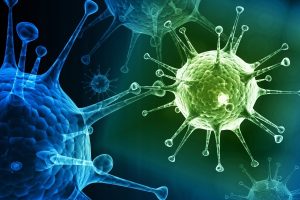Introduction
In a world that has recently battled a global pandemic and continues to face various infectious threats viruses, bacteria, and fungi the question on everyone’s mind is: why do some people get sick, and others don’t?

We all know someone who’s constantly battling one infection or the other and someone else who never seems to catch anything, even when exposed. Is it luck? Genetics? Lifestyle? Or is there something more going on beneath the surface?
This blog dives deep yet accessible into the hidden secrets of why some people seem naturally shielded from infections while others are more vulnerable. It’s not magic; it’s science (with a dash of mystery).
1. The Body’s Natural Defense: Your Immune System
The immune system is your body’s frontline army. It’s made up of cells, tissues, and organs that work together to fight off invaders. When functioning properly, it spots threats like viruses and bacteria and launches an appropriate response.
But here’s the catch: not all immune systems are created equal.

2. Genetic Armor: The Role of DNA
Some people are literally born with better defenses. Certain genetic mutations can give an edge when it comes to fighting off infections. For instance:
CCR5-Δ32 Mutation: A small percentage of people carry this gene variant, which makes them resistant to HIV infection.
HLA Variants: These genes help the immune system distinguish between your body and foreign threats. Some variants are more efficient than others.
Basically, your DNA can be your secret shield—or your hidden weakness.
3. The Hygiene Hypothesis: Childhood Exposure Matters
Ironically, being too clean might not be a good thing. People who were exposed to a diverse set of germs in childhood think playing in the dirt, being around pets, or attending daycare often develop stronger immune systems.
Early exposure helps train your immune system to respond more efficiently, kind of like a fire drill for your white blood cells.
4. Lifestyle Choices That Strengthen (or Weaken) Immunity

Beyond genetics, your daily habits can either reinforce or wreck your body’s defense system. Let’s break it down:
Helpful Habits Vs Harmful Habits
Regular exercise === Chronic stress
Balanced, whole-food diet === Diet high in sugar & processed food
Quality sleep (7-9 hrs) === Poor sleep hygiene
Proper hydration === Excessive alcohol or smoking
A strong immune system is not just about pills and vaccines, it’s about consistency in healthy living.
5. Microbiome Magic: The Good Germs in Your Gut
Your gut isn’t just for digestion it’s a major player in immunity. The human gut contains trillions of bacteria (your microbiome) that interact with your immune system.
A healthy microbiome can:
* Crowd out harmful bacteria
* Train immune cells to respond properly
* Reduce inflammation
Probiotic-rich foods (like yogurt, kefir, sauerkraut) and fiber from fruits and veggies can help keep your gut—and your immune system—in top shape.
6. Silent Immunity: Asymptomatic Carriers and Natural Resistance
Some people do get infected but never show symptoms. These are called asymptomatic carriers. Their immune systems contain the virus before it can cause trouble. In some cases, they develop sterilizing immunity, meaning the pathogen can’t even gain a foothold.

This is common with diseases like:
^ COVID-19
^ TuberculosisH
^ Hepatitis B
What’s going on here? Again, it’s a mix of genes, previous exposures, and a highly responsive immune system.
7. Vaccines: Training the Body for Battle
Vaccines don’t “shield” you in the traditional sense—they teach your immune system what to look out for. Like a wanted poster for a virus.
People who are fully vaccinated and maintain healthy immune systems often show minimal or no symptoms when exposed to viruses they’re vaccinated against.
This trained immunity can be the difference between severe illness and a mild cold.
8. The X-Factor: Unexplained Immunity
Science still doesn’t have all the answers. Some people resist infections even without known protective factors. These are the “mystery cases” that researchers are studying intensely.
Some current theories include:
Unique T-cell responses
“Memory” from exposure to similar pathogens
Epigenetic modifications (how your environment affects gene expression)
It’s a powerful reminder that the human body is still full of untapped mysteries.
CAN YOU BOOST YOUR SHIELD?
While you can’t change your genes, you can control many of the factors that influence your immune strength:
∆ Eat nutrient-dense foods
∆ Stay active
∆ Prioritize rest
∆ Manage stress
∆ Keep your environment clean, but not sterile
∆ Stay up to date on recommended vaccines
You may not be bulletproof, but with the right habits, you can give your body a fighting chance.
Conclusion
Infection resistance isn’t just for the lucky few—it’s a complex interplay of genetic.
